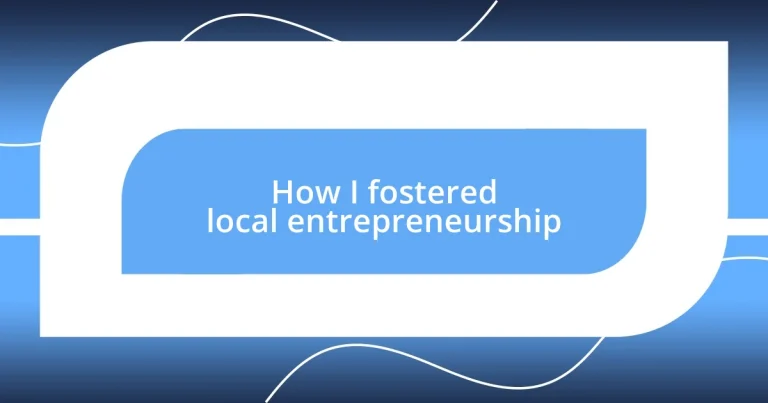Key takeaways:
- Local entrepreneurship embodies community spirit and resilience, fostering economic growth and sustainability while highlighting the importance of supporting neighborhood businesses.
- Identifying community needs through surveys, focus groups, and observation is essential for creating an environment where local entrepreneurs can thrive.
- Mentorship and resource provision, coupled with sharing success stories, cultivate a supportive network that empowers individuals and inspires collective growth within the community.
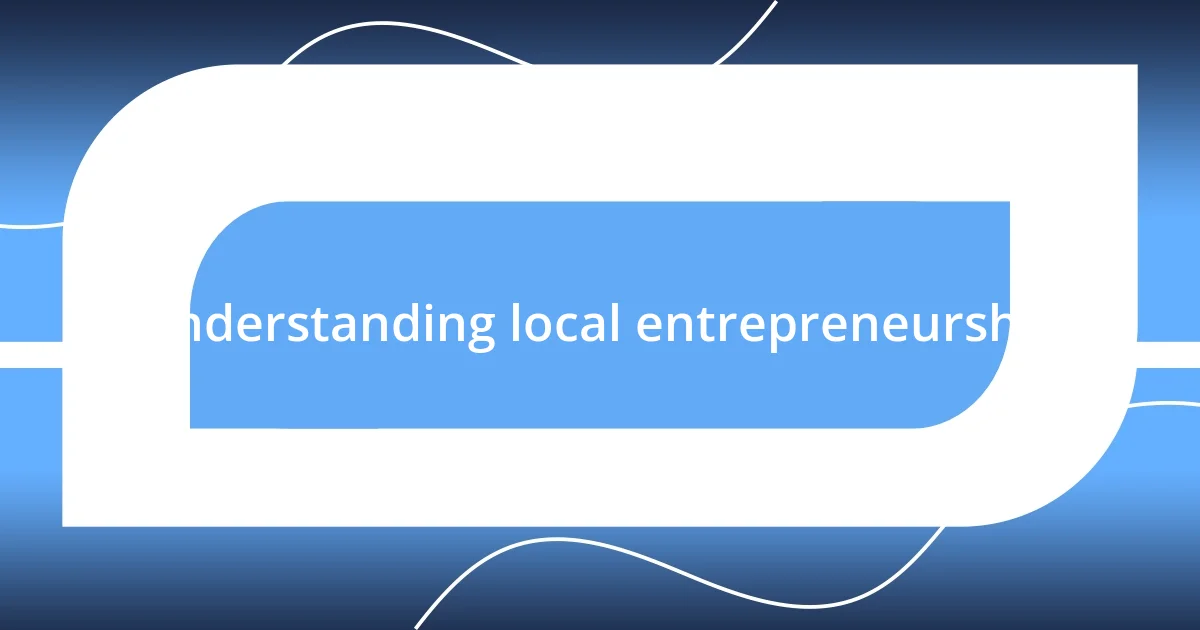
Understanding local entrepreneurship
Local entrepreneurship is more than just a business; it’s about community, culture, and resilience. I remember the first time I attended a local market. The hustle and bustle, the pride in the vendors’ voices as they shared their stories—it struck a chord in me. Isn’t it fascinating how these small businesses can reflect the spirit of their neighborhoods?
When I think of local entrepreneurs, I often consider the risks they take and the dreams they chase. Each entrepreneur has a story that adds texture to our community tapestry, and I’ve witnessed how these stories inspire others to pursue their passions. Have you ever challenged yourself to consider the hurdles a local business owner faces? I have, and it’s opened my eyes to the creativity and grit required to succeed in today’s economy.
Moreover, local entrepreneurship fosters economic growth and sustainability. I’ve seen firsthand how a thriving local business can revitalize a struggling area, bringing in foot traffic and new opportunities for everyone. It makes me think—what impact do our purchasing choices have on the businesses around us? By supporting local ventures, we invest in our community’s future, creating a ripple effect that benefits us all.
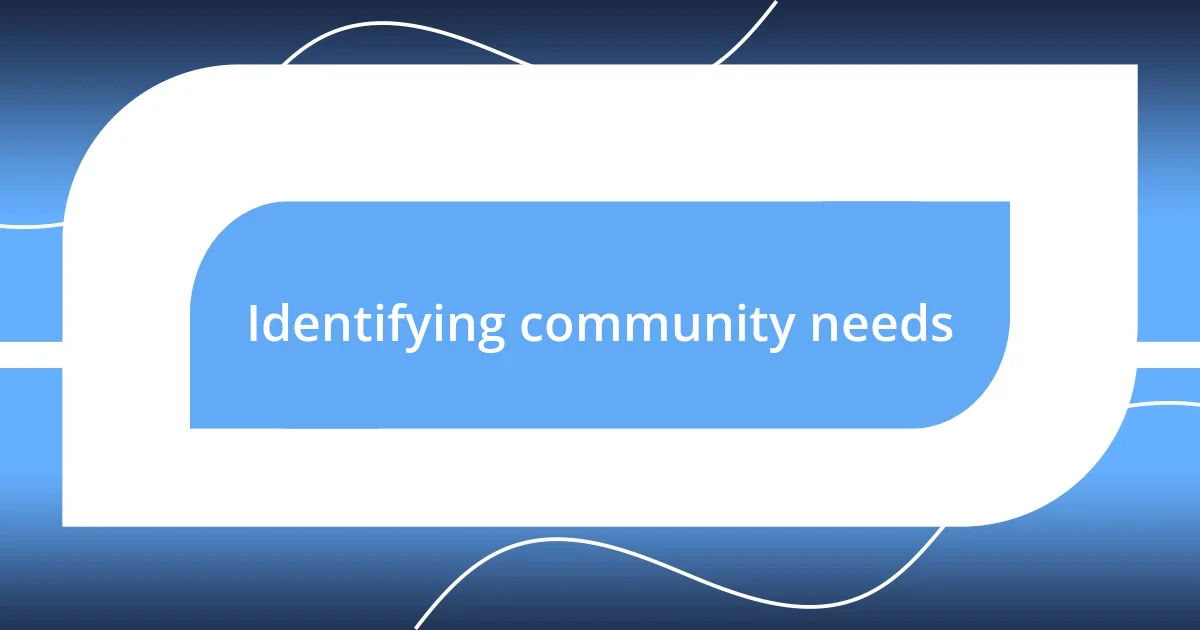
Identifying community needs
Identifying the needs of a community is like tuning into a conversation that’s been going on for years. I vividly remember the time I organized a small roundtable with local residents. Their stories about lacking adequate services—from affordable childcare to coworking spaces—were enlightening. It became clear that understanding these needs wasn’t just important; it was essential for fostering local entrepreneurship.
To effectively pinpoint community needs, I found these methods helpful:
- Conduct surveys: Engaging locals through surveys can reveal unmet needs and desires.
- Host focus groups: Direct conversations can uncover deeper insights into what community members truly value.
- Observe trends: Keeping an eye on local businesses that are thriving can indicate what resources the community is desperately seeking.
- Analyze demographic data: Data can showcase shifts in age, occupation, and income, guiding entrepreneurs on where to focus their efforts.
Taking these steps not only enhances community involvement but also lays a solid groundwork for local entrepreneurs to thrive. It reminds me of how small changes can catalyze broader impacts.
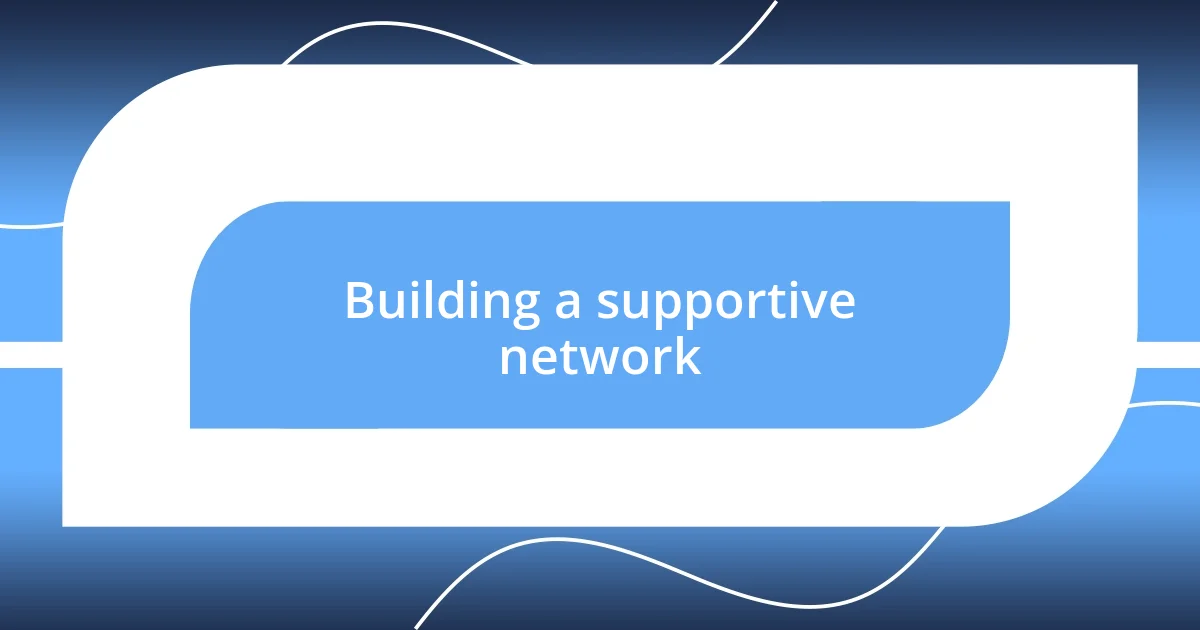
Building a supportive network
Building a supportive network is crucial for the success of local entrepreneurship. I recall attending a networking event where individuals from different industries came together to share experiences and insights. There’s a certain electricity in the air when like-minded people connect, each fostering collaboration and support. Have you ever felt that sense of community? It’s invigorating and can spark new ideas and partnerships.
Moreover, I’ve learned that mentorship plays a pivotal role in nurturing entrepreneurial talent. One memorable instance was when I paired a seasoned business owner with an eager newcomer. Watching their relationship flourish was heartwarming. The mentor not only shared invaluable lessons but also provided moral support during challenging times. This experience reaffirmed my belief in the adage, “It takes a village.”
To create a well-rounded ecosystem for entrepreneurs, I found it beneficial to snag different stakeholders—local government, educational institutions, and even established businesses—into the conversation. One approach I championed was forming business clusters. For example, by linking coffee shop owners with local artisans, we fostered a collaborative atmosphere that benefited everyone involved. This interconnectedness has the power to elevate the entire community, making it a hub of creativity and innovation.
| Element | Description |
|---|---|
| Networking events | Bringing together diverse individuals to share experiences and create connections. |
| Mentorship | Providing guidance and emotional support to budding entrepreneurs. |
| Business clusters | Grouping related businesses to cultivate collaboration and innovation. |
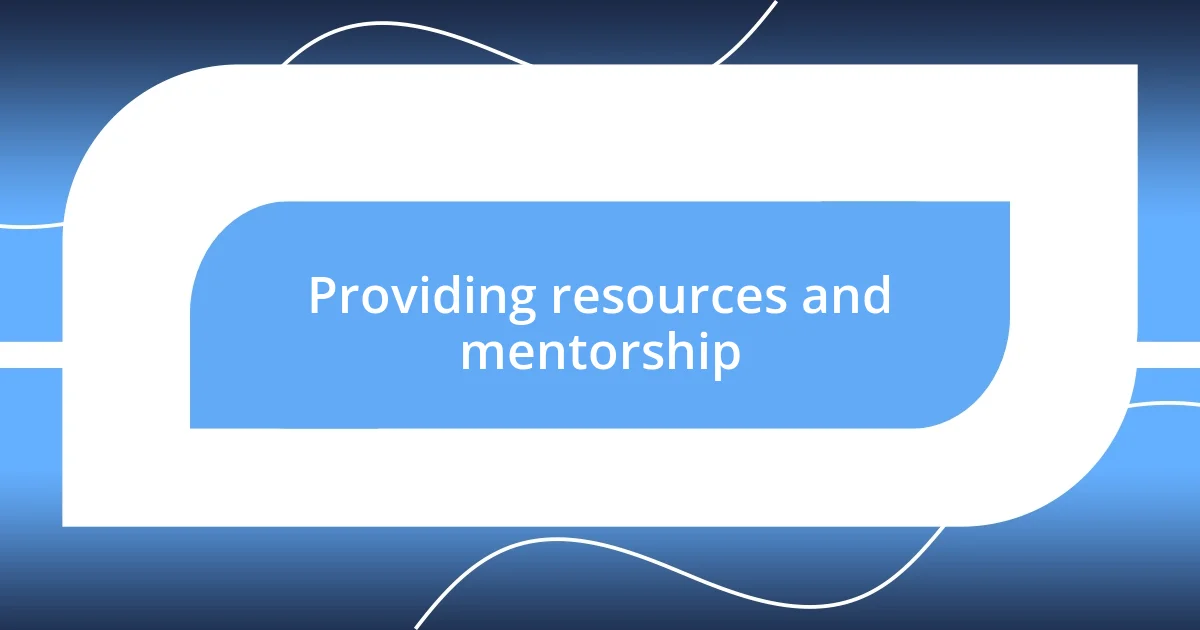
Providing resources and mentorship
Mentorship is a game changer in local entrepreneurship. I remember when I first initiated a mentorship program, pairing experienced entrepreneurs with fresh faces eager to learn. Seeing the joy in a mentee’s eyes as they landed their first client was priceless. It made me think, how often do we underestimate the power of guidance? Those small interactions can lead to remarkable growth, transforming uncertainty into confidence.
Providing resources is equally vital. I once helped set up a community resource center that offered access to free workshops, a shared workspace, and essential tools for startup endeavors. The shift in energy was palpable! I often saw new entrepreneurs huddled together, brainstorming ideas and becoming the support system for one another. Honestly, wouldn’t it be amazing if every community had such a hub where dreams could become reality?
I’ve also noticed that combining mentorship with tangible resources creates an unbeatable formula for success. During one event, I brought in local experts to offer hands-on training sessions. I’ll never forget the sense of excitement that filled the room as attendees collaborated, problem-solving and pushing each other’s ideas further. It emphasizes a crucial point—when resources and mentorship intertwine, they supercharge local entrepreneurship and amplify the voices that need to be heard.
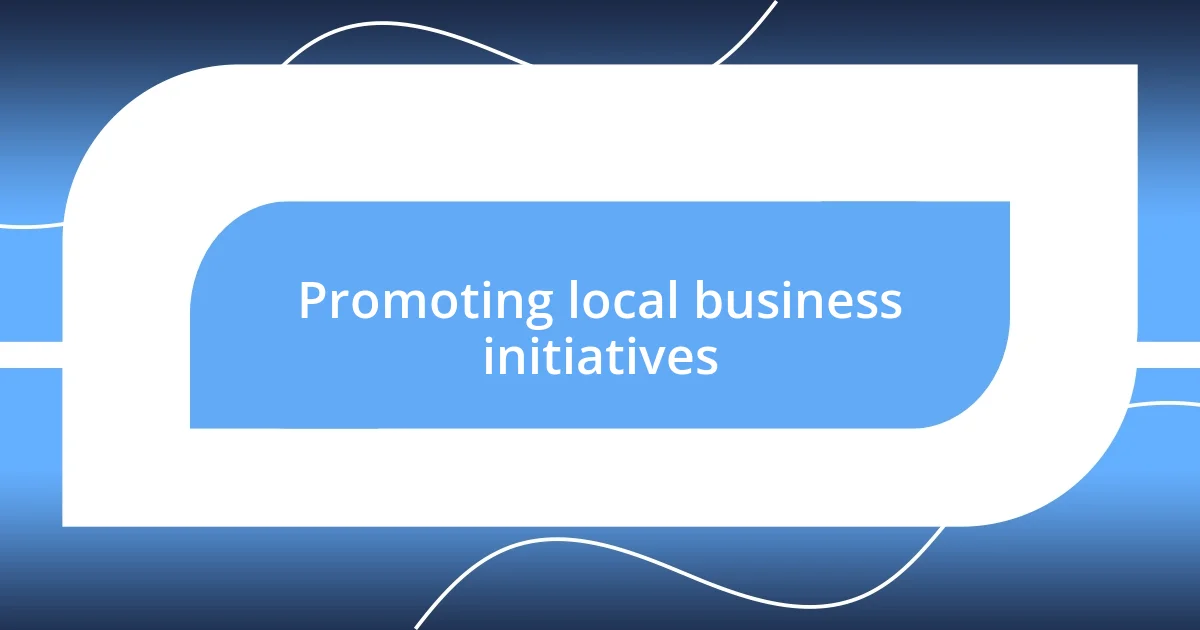
Promoting local business initiatives
Promoting local business initiatives can really transform a community. I recall volunteering for a local market day, where small business owners showcased their products. The buzz in the air was incredible, and it was heartening to see families enjoying the day while supporting their neighbors. Isn’t it fascinating how a simple event can cultivate a strong sense of loyalty to local businesses?
I organized workshops that focused on marketing strategies specifically for small-scale ventures. Once, I had a participant who said she felt invisible in her own community until she learned how to promote her handmade crafts effectively. Her realization was a lightbulb moment, reminding me that education can be a powerful tool in building confidence. Have you ever had that experience of suddenly feeling seen?
Leveraging social media to promote local businesses is another essential initiative I wholeheartedly believe in. I’ve started several campaigns that encouraged residents to share their favorite local spots online using a unique hashtag. Watching a community come together to celebrate one another has been nothing short of inspiring. What if every time we posted, we could strengthen our local economy? Imagine the collective impact we could achieve!

Measuring success and impact
Measuring the success and impact of fostering local entrepreneurship often starts with gathering feedback from the entrepreneurs themselves. I remember hosting a post-event survey after one of our workshops, curious to hear how participants felt about the experience. The responses were eye-opening! Entrepreneurs shared that not only did they gain valuable skills, but many also formed lasting connections that propelled their businesses forward. Isn’t it remarkable how qualitative data can often tell a deeper story than numbers alone?
On a more quantitative side, tracking metrics like revenue growth and job creation provides tangible evidence of community impact. When I analyzed the data after a local pitch contest I organized, I was thrilled to see participating startups collectively boost their revenues by over 30% in just six months! This sort of growth tells me something powerful: local entrepreneurship initiatives can redefine economic landscapes when they’re executed thoughtfully. But how do we replicate that success in new communities?
Perhaps one of the most moving ways to measure impact is through the personal stories of those who benefited from our programs. I had the pleasure of reconnecting with a young entrepreneur who once struggled to make ends meet. She shared how our workshops inspired her to pursue her dream of opening a bakery, and now she’s become a staple in the neighborhood. Listening to her journey reminded me that the true measure of success lies not just in numbers or policies, but in the lives we touch along the way. What legacy are we creating through our efforts, and how can that inspire others?
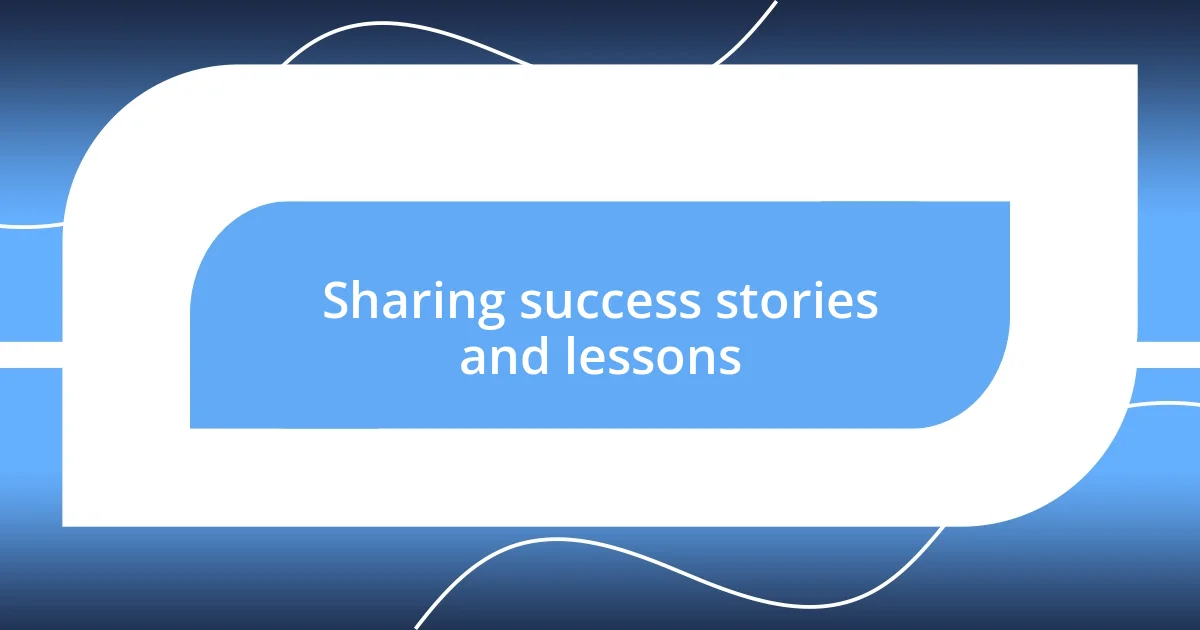
Sharing success stories and lessons
Sharing success stories can be a powerful motivator. I once attended a community event where a local artist detailed her journey from a struggling freelancer to a celebrated muralist. As she spoke, it was clear that her passion and persistence struck a chord with everyone in the audience. It made me wonder: how many people leave such events inspired to pursue their dreams after hearing just one person’s triumph?
I believe lessons learned from these stories are invaluable. At a lunch-and-learn session I organized, a small business owner shared how he overcame initial failures by pivoting his business model based on customer feedback. His openness about the bumps in the road fostered an environment of trust and connection among attendees. Isn’t it comforting to know we’re not alone in our struggles?
One of my favorite moments was when a group of budding entrepreneurs came together to discuss their fears and aspirations. I encouraged them to share their success stories, big or small. One participant revealed how he improved his sales by simply attending a networking event he initially dreaded. That moment of honesty sparked a lively discussion on the importance of stepping out of one’s comfort zone. Don’t you think that sharing our journeys, not just the polished victories but also the tough lessons, helps us all grow?












